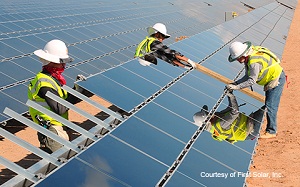Solar developers discuss investment needs for Colorado’s solar market
 On Nov. 4, a panel of Colorado-based solar executives met with executives from national and regional banks at the “Solar Finance Roundtable” hosted by the Colorado Bankers Association and the Colorado Solar Energy Industries Association (COSEIA).
On Nov. 4, a panel of Colorado-based solar executives met with executives from national and regional banks at the “Solar Finance Roundtable” hosted by the Colorado Bankers Association and the Colorado Solar Energy Industries Association (COSEIA).
The solar-financing roundtable, held at St. Julien’s hotel in Boulder, Colo., was a unique opportunity for the various players in both industries to discuss how to help move the solar industry forward.
“Solar-related financing is one of the top pain points in the solar industry today,” said COSIEA Executive Director Neil Lurie.
It’s one of the top challenges that is inhibiting faster growth in solar, according to Lurie.
“Based on the feedback we've heard from the industry and our members, we estimate that about 80 to 90 percent of solar businesses in Colorado lack the financing that they need to be able to broker business deals that helps support customer needs,” he said.
AC Solar, which has installed solar on about 600 homes, half on-grid, half off-grid, could benefit from financing, said Co-Owner JoElyn Newcomb.
“If I had an easy financing program, I would double my size tomorrow,” she said.
At this point she said the company has so much business and limited access to financing that Newcomb only looks at customers that can pay for a system outright.
Still, options are becoming more open for homeowners, said Justin Pentelute, CEO of Syndicated Solar, which focuses primarily on commercial and utility solar development.
“Residential solar is definitely starting to gain. I think right now there's a lot of financing options that make a tremendous amount of economic sense,” he said.
However, he sees a gap in financing available for projects in between residential and large-scale commercial or utility-scale projects.
“We're seeing issues getting anyone approved that's not investment grade,” he said. “That's the biggest issues that we're coming up against.”
Out of 15 solar project proposals generally only one secures financing. That’s despite companies having good balance sheets, according to Pentelute.
There’s also an issue with the products available to support solar financing.
“There are no loans designed for solar,” Pentelute said.
Most loans aren’t designed for periods longer than 10 years.
“It isn't really consistent with the life of a solar asset, which is 25 years,” said Pentelute.
This could be fixed to some tweaks to existing offerings, which sounds easy, but isn’t, he said.
Thus far the best options for commercial clients with a yen for tax equity are capital lease options. For those that don’t want tax equity financing, Syndicated Solar finds that third-party operating leases are a good way to go.
“The power-purchase agreements have been the most difficult to process because there is no standardized agreement. It's really difficult to negotiate when you have three parties going to war on what's acceptable,” Pentelute said.
The need for solar companies to better educate bankers on solar benefits was clear.
“There are plenty of bankers that have no clue what a solar system is,” said Mike Healy, a founder of solar thermal developer Skyline Innovations. “I can't tell you how many conversations started or ended with 'alright so it collects the heat, and then electricity comes from there, and that's how you heat the hot water.' There is clearly an education gap. We need to educate them.”
Such work will help bankers become more familiar with solar.



